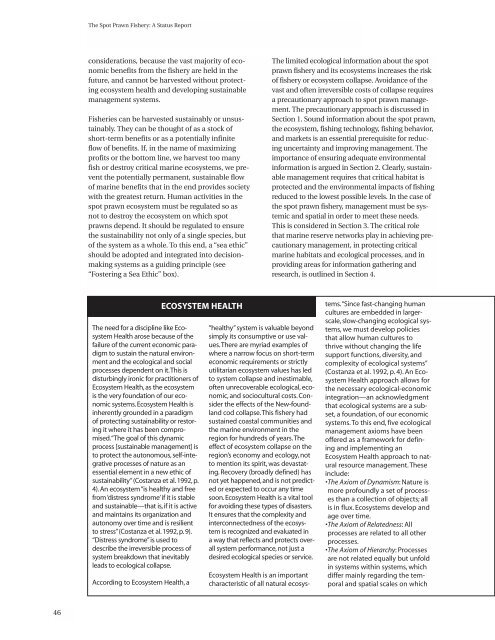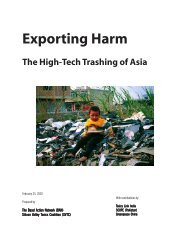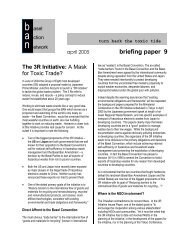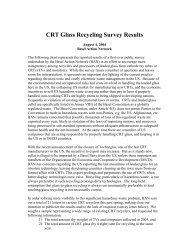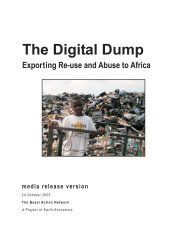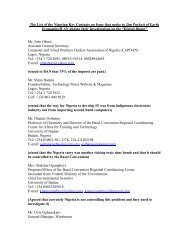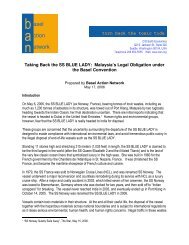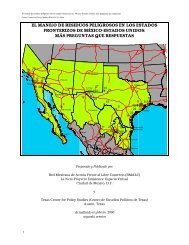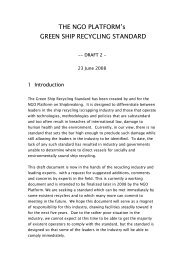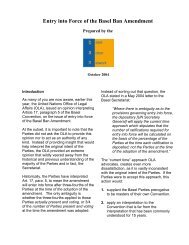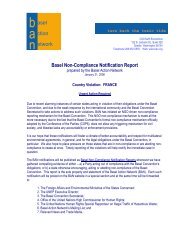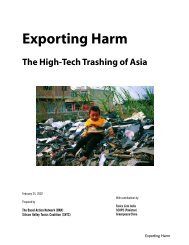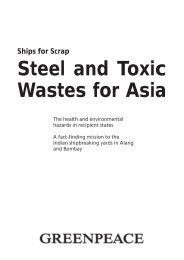The Spot Prawn Fishery The Spot Prawn Fishery - Basel Action ...
The Spot Prawn Fishery The Spot Prawn Fishery - Basel Action ...
The Spot Prawn Fishery The Spot Prawn Fishery - Basel Action ...
Create successful ePaper yourself
Turn your PDF publications into a flip-book with our unique Google optimized e-Paper software.
46<br />
<strong>The</strong> <strong>Spot</strong> <strong>Prawn</strong> <strong>Fishery</strong>: A Status Report<br />
considerations, because the vast majority of economic<br />
benefits from the fishery are held in the<br />
future, and cannot be harvested without protecting<br />
ecosystem health and developing sustainable<br />
management systems.<br />
Fisheries can be harvested sustainably or unsustainably.<br />
<strong>The</strong>y can be thought of as a stock of<br />
short-term benefits or as a potentially infinite<br />
flow of benefits. If, in the name of maximizing<br />
profits or the bottom line, we harvest too many<br />
fish or destroy critical marine ecosystems, we prevent<br />
the potentially permanent, sustainable flow<br />
of marine benefits that in the end provides society<br />
with the greatest return. Human activities in the<br />
spot prawn ecosystem must be regulated so as<br />
not to destroy the ecosystem on which spot<br />
prawns depend. It should be regulated to ensure<br />
the sustainability not only of a single species, but<br />
of the system as a whole. To this end, a “sea ethic”<br />
should be adopted and integrated into decisionmaking<br />
systems as a guiding principle (see<br />
“Fostering a Sea Ethic” box).<br />
<strong>The</strong> need for a discipline like Ecosystem<br />
Health arose because of the<br />
failure of the current economic paradigm<br />
to sustain the natural environment<br />
and the ecological and social<br />
processes dependent on it.This is<br />
disturbingly ironic for practitioners of<br />
Ecosystem Health, as the ecosystem<br />
is the very foundation of our economic<br />
systems. Ecosystem Health is<br />
inherently grounded in a paradigm<br />
of protecting sustainability or restoring<br />
it where it has been compromised.“<strong>The</strong><br />
goal of this dynamic<br />
process [sustainable management] is<br />
to protect the autonomous, self-integrative<br />
processes of nature as an<br />
essential element in a new ethic of<br />
sustainability”(Costanza et al. 1992, p.<br />
4). An ecosystem “is healthy and free<br />
from ‘distress syndrome’ if it is stable<br />
and sustainable—that is, if it is active<br />
and maintains its organization and<br />
autonomy over time and is resilient<br />
to stress”(Costanza et al. 1992, p. 9).<br />
“Distress syndrome”is used to<br />
describe the irreversible process of<br />
system breakdown that inevitably<br />
leads to ecological collapse.<br />
According to Ecosystem Health, a<br />
ECOSYSTEM HEALTH<br />
“healthy” system is valuable beyond<br />
simply its consumptive or use values.<strong>The</strong>re<br />
are myriad examples of<br />
where a narrow focus on short-term<br />
economic requirements or strictly<br />
utilitarian ecosystem values has led<br />
to system collapse and inestimable,<br />
often unrecoverable ecological, economic,<br />
and sociocultural costs. Consider<br />
the effects of the New-foundland<br />
cod collapse.This fishery had<br />
sustained coastal communities and<br />
the marine environment in the<br />
region for hundreds of years.<strong>The</strong><br />
effect of ecosystem collapse on the<br />
region’s economy and ecology, not<br />
to mention its spirit, was devastating.<br />
Recovery (broadly defined) has<br />
not yet happened, and is not predicted<br />
or expected to occur any time<br />
soon. Ecosystem Health is a vital tool<br />
for avoiding these types of disasters.<br />
It ensures that the complexity and<br />
interconnectedness of the ecosystem<br />
is recognized and evaluated in<br />
a way that reflects and protects overall<br />
system performance, not just a<br />
desired ecological species or service.<br />
Ecosystem Health is an important<br />
characteristic of all natural ecosys-<br />
<strong>The</strong> limited ecological information about the spot<br />
prawn fishery and its ecosystems increases the risk<br />
of fishery or ecosystem collapse. Avoidance of the<br />
vast and often irreversible costs of collapse requires<br />
a precautionary approach to spot prawn management.<br />
<strong>The</strong> precautionary approach is discussed in<br />
Section 1. Sound information about the spot prawn,<br />
the ecosystem, fishing technology, fishing behavior,<br />
and markets is an essential prerequisite for reducing<br />
uncertainty and improving management. <strong>The</strong><br />
importance of ensuring adequate environmental<br />
information is argued in Section 2. Clearly, sustainable<br />
management requires that critical habitat is<br />
protected and the environmental impacts of fishing<br />
reduced to the lowest possible levels. In the case of<br />
the spot prawn fishery, management must be systemic<br />
and spatial in order to meet these needs.<br />
This is considered in Section 3. <strong>The</strong> critical role<br />
that marine reserve networks play in achieving precautionary<br />
management, in protecting critical<br />
marine habitats and ecological processes, and in<br />
providing areas for information gathering and<br />
research, is outlined in Section 4.<br />
tems.“Since fast-changing human<br />
cultures are embedded in largerscale,<br />
slow-changing ecological systems,<br />
we must develop policies<br />
that allow human cultures to<br />
thrive without changing the life<br />
support functions, diversity, and<br />
complexity of ecological systems”<br />
(Costanza et al. 1992, p. 4). An Ecosystem<br />
Health approach allows for<br />
the necessary ecological-economic<br />
integration—an acknowledgment<br />
that ecological systems are a subset,<br />
a foundation, of our economic<br />
systems. To this end, five ecological<br />
management axioms have been<br />
offered as a framework for defining<br />
and implementing an<br />
Ecosystem Health approach to natural<br />
resource management. <strong>The</strong>se<br />
include:<br />
•<strong>The</strong> Axiom of Dynamism:Nature is<br />
more profoundly a set of processes<br />
than a collection of objects; all<br />
is in flux. Ecosystems develop and<br />
age over time.<br />
•<strong>The</strong> Axiom of Relatedness:All<br />
processes are related to all other<br />
processes.<br />
•<strong>The</strong> Axiom of Hierarchy:Processes<br />
are not related equally but unfold<br />
in systems within systems, which<br />
differ mainly regarding the temporal<br />
and spatial scales on which


